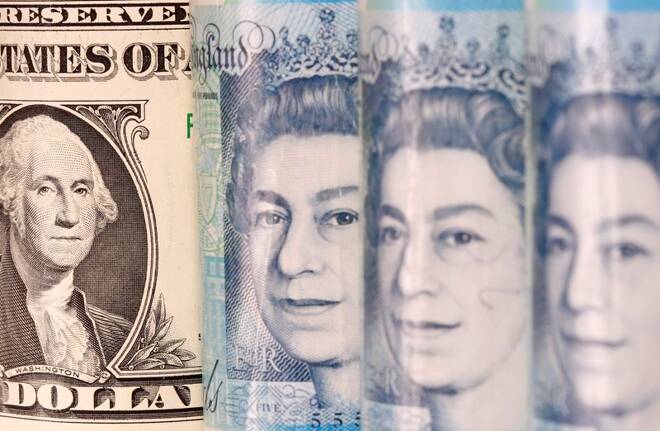Advertisement
Advertisement
Sterling at 2-year low against dollar as Boris Johnson hangs on
By:
By Lucy Raitano LONDON (Reuters) - A battered British pound steadied on Wednesday but did not stray far from more than two-year lows against the dollar as British Prime Minister Boris Johnson clung to power after key cabinet members quit unexpectedly.
By Lucy Raitano
LONDON (Reuters) -Britain’s pound hit a more than two-year low against the dollar on Wednesday as Prime Minister Boris Johnson clung to power despite the resignation of key cabinet members.
Analysts said that the pound was mostly moving on broader economic concerns about a global recession, rather than Britain’s political turmoil.
Worries about Britain’s sky-high inflation and a slowing economy, which have driven the currency’s weakness in recent months, remain the key focus for sterling traders.
“The market really cements the view that growth is going lower while inflation is going high, stagflationary fears are settling in which is positive for the dollar but negative for growth sensitive currencies like the euro and sterling,” said Chris Turner, ING’s Head of FX Strategy.
By 1500 GMT the pound was down 0.41% versus a broadly stronger dollar at $1.19100, having earlier hit $1.18770, its lowest level since March 2020.
Sterling rose against a weaker euro, up 0.31% to 85.570 pence, after the single currency hit its lowest level since December 2002 on concerns over energy prices.
“Markets have now all but written off Boris Johnson as PM,” Adam Cole, head of currency strategy at RBC Capital Markets, said.
“There is no real clear frontrunner to replace him and the potential PMs run to a dozen different people, without a view on that it’s difficult to say what Boris’ replacement would mean for policy.”
Separately, Bank of England Chief Economist Huw Pill said on Wednesday that Britain’s economy would slow to a crawl over the next 12 months and repeated his preference for a “steady-handed” approach to raising interest rates.
Analysts expect the BoE to increase rates by as much as 50 basis points at its next meeting on Aug. 4, which would be its sixth rate hike since December as it grapples with inflation at 40-year highs.
(Reporting by Lucy Raitano; Editing by Dhara Ranasinghe, Alison Williams, Chizu Nomiyama and Alexander Smith)
About the Author
Reuterscontributor
Reuters, the news and media division of Thomson Reuters, is the world’s largest international multimedia news provider reaching more than one billion people every day. Reuters provides trusted business, financial, national, and international news to professionals via Thomson Reuters desktops, the world's media organizations, and directly to consumers at Reuters.com and via Reuters TV. Learn more about Thomson Reuters products:
Did you find this article useful?
Latest news and analysis
Advertisement
